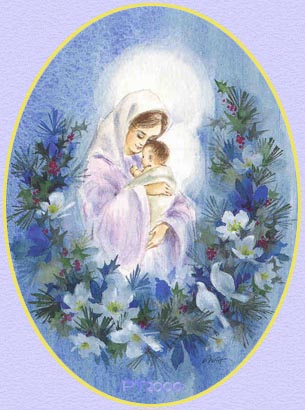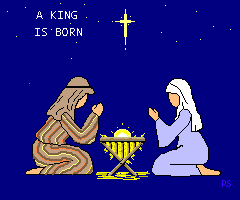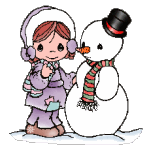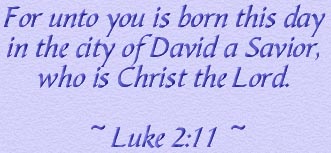
| 
|

Christmas commemorates the Birth of Jesus (estimated birth 6 BC). The fullest Bible account of this is found in Luke 2: 1-20. Verses 1-7 describe the events leading to Jesus' birth:
"In those days Caesar Augustus issued a decree that a census should be taken of the entire Roman world. (This was the first census that took place while Quirinius was governor of Syria.) And everyone went to his own town to register. So Joseph also went up from the town of Nazareth in Galilee to Judea, to Bethlehem the town of David, because he belonged to the house and line of David. He went there to register with Mary, who was pledged to be married to him and was expecting a child. While they were there, the time came for the baby to be born, and she gave birth to her firstborn, a son. She wrapped him in cloths and placed him in a manger, because there was no room for them in the inn."
More information on events following the birth of Jesus is found in Matthew 2: 1-23. These include the visit of the Magi (Wise Men), King Herod, Jesus' escape to Egypt, the Slaughter of the Innocents and Jesus' return to Nazareth.
Verses 1-2:
"Where is the one who has been born King of the Jews? We saw his star in the east and have come to worship him."
Verses 7-8:
"Go and make a careful search for the child. As soon as you find him, report to me, so that I too may go and worship him."
The Magi's enquiries in Jerusalem disturbed King Herod the Great, (37-4 BC), who knew that the prophet Micah had predicted 700 years previously that the Messiah would be born in Bethlehem. Herod was appointed King of Judea by Rome, murdering a wife, (he married 10 times), three sons, mother-in-law, brother-in-law and uncle to cling to power. His reign was also noted for the many ampitheatres, monuments and fortresses he erected and for starting the rebuilding of the Temple in Jerusalem.
Verses 9-12:
The Epiphany (January 6) is the 12th day of Christmas and commemorates the Visit of the Magi to the infant Jesus.
The word Christmas is derived from the Old English Cristes maesse, "Christ's Mass." There is no certain tradition of the date of Christ's birth, only estimations. In the third century, Christian time measurers believed that the creation of the world took place at the spring equinox (March 25), therefore this was new creation in the incarnation (the conception). Christ's birth would occur nine months later during the winter solstice, December 25. The oldest existing notice indicates that the festival of Christmas was observed by the church in Rome by the year 336.
The festival spread from Rome to other churches of the West and East. The last to adopt the festival was the Church of Jerusalem, during Bishop Juvenal reign (424-458). Coordinated with Epiphany, a feast of Eastern origin commemorating the manifestation of Christ to the world, the celebration of the incarnation of Christ as Redeemer and Light of the world was favored by the intense concern of the church of the 4th and 5th centuries in formulating creeds and dogmatic definitions relating to Christ's divine and human natures.
Christmas is the most popular of all festivals among Christians and many non-Christians alike, and its observance combines many strands of tradition. From the ancient Roman pagan festivals of Saturnalia (December 17) and New Year's come the merrymaking and exchange of presents. Old Germanic midwinter customs have contributed the lighting of the Yule log and decorations with evergreens. The Christmas tree comes from medieval German mystery plays centred in representations of the Tree of Paradise (Genesis 2:9). Francis of Assisi popularized the Christmas crib, or crèche, in his celebration at Greccio, Italy, in 1223.
Another popular medieval feast was that of St. Nicholas of Myra (c. 340) on December 6, when the saint was believed to visit children with admonitions and gifts, in preparation for the gift of the Christ child at Christmas. Through the Dutch the tradition of St. Nicholas (Sinterklaas, hence "Santa Claus") was brought to America in their colony of New Amsterdam, now New York. The sending of greeting cards at Christmas began in Britain in the 1840s and was introduced to the United States in the 1870s.
After Jesus was born in Bethlehem in Judea, during the time of King Herod, Magi came from the east to Jerusalem and asked,
Then Herod called the Magi secretly and found out from them the exact time the star had appeared. He sent them to Bethlehem and said,
After they had heard the King, they went on their way, and the star they had seen in the east went ahead of them until it stopped over the place where the child was. When they saw the star they were overjoyed. On coming to the house, they saw the child with his mother Mary, and they bowed down and worshipped him. Then they opened their treasures and presented him with gifts of gold, and of incense and of myrrh. And having been warned in a dream not to go back to Herod, they returned to their country by another route.
Said the night wind to the little lamb
Said the little lamb to the shepherd boy
Said the shepherd boy to the mighty king
Said the king to the people everywhere
The child, the child
Do you see what I see?
Way up in the sky little lamb
Do you see what I see?
A star, a star
Dancing in the night
With a tail as big as a kite
With a tail as big as a kite
Do you hear what I hear?
Ringing through the sky shepherd boy
Do you hear what I hear?
A song, a song
High above the tree
With a voice as big as the sea
With a voice as big as the sea
Do you know what I know?
In your palace wall mighty king
Do you know what I know?
A child, a child
Shivers in the cold
Let us bring him silver and gold
Let us bring him silver and gold
Listen to what I say
Pray for peace people everywhere
Listen to what I say
The child, the child
Sleeping in the night
He will bring us goodness and light
He will bring us goodness and light
Sleeping in the night
He will bring us goodness and light

|  |



